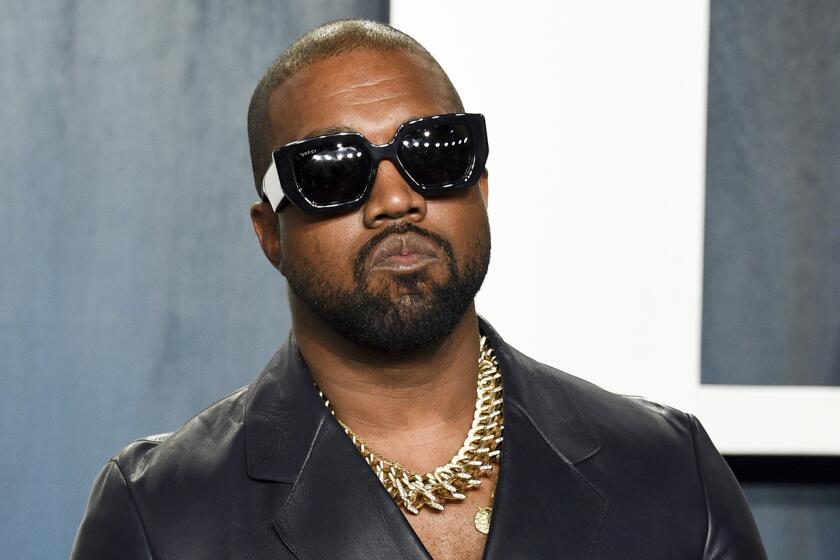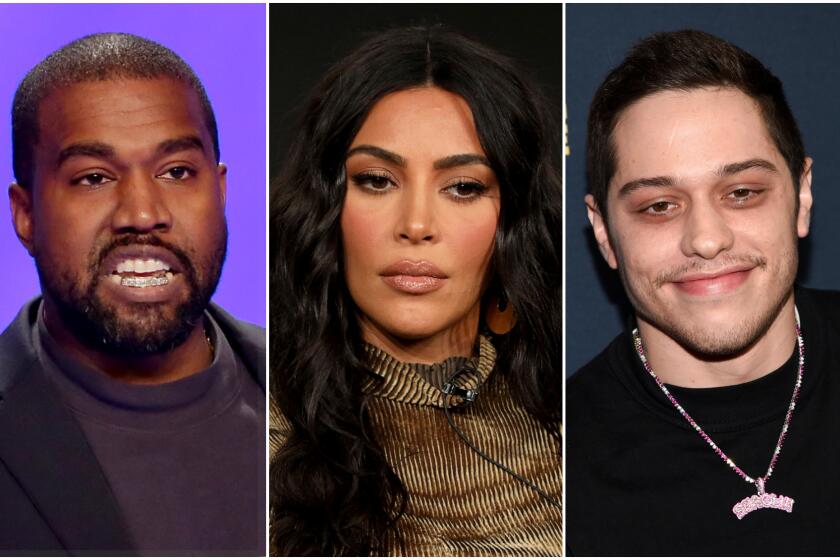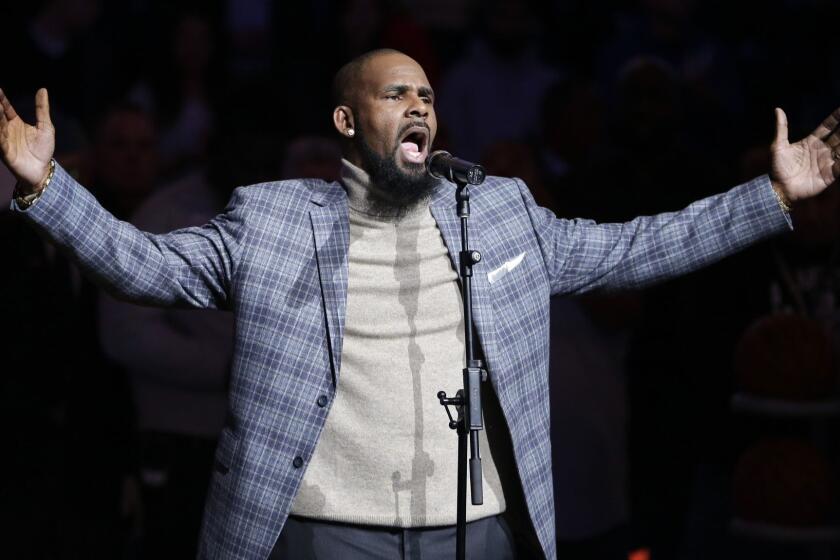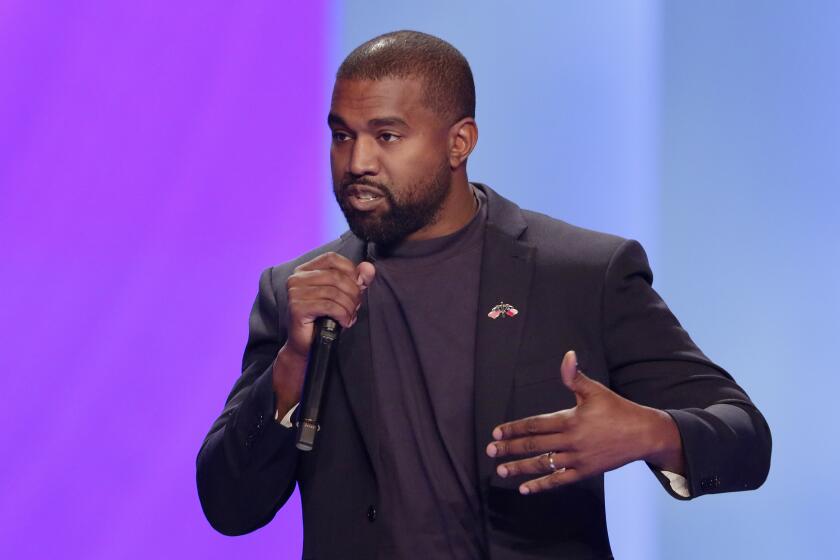Why Spotify and Apple Music haven’t pulled Kanye West’s songs
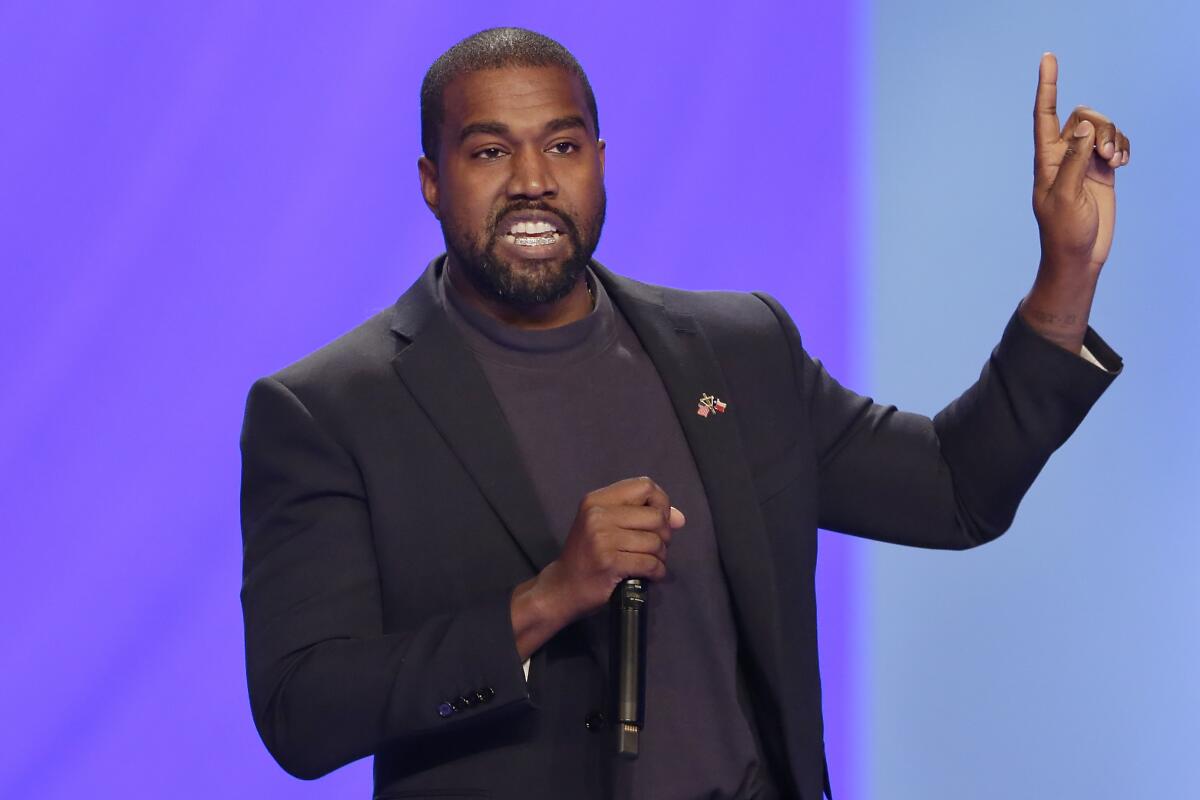
- Share via
A week after Endeavor Chief Executive Ari Emanuel called for businesses to cut ties with the artist formerly known as Kanye West after his antisemitic remarks, companies such as Adidas and the Gap stopped working with him.
But others, including streamers Apple Music, Spotify and Amazon Music, still feature Ye’s music on their playlists.
CAA, one of Hollywood’s biggest talent agencies, has stopped representing the artist formerly known as Kanye West.
Apple Music and Tidal, which also streams West’s music, did not respond to a request for comment. Amazon Music declined to comment.
But industry analysts say the decision to take down Ye’s music is complicated by several factors, including contract requirements streamers may have with record labels and publishers, free speech considerations and whether it is appropriate to take action against an artist’s behavior outside of their music.
On Tuesday, Spotify CEO Daniel Ek told Reuters that even though he found West’s antisemitic comments “just awful,” they aren’t in West’s music that is streaming on Spotify. “It’s really just his music, and his music doesn’t violate our policy,” Ek told Reuters.
Ye has been heavily criticized for antisemitic comments and false statements made about the Holocaust and Jewish people. Those viewpoints, which were made outside of his albums and songs, caused a swift backlash.
“Silence is dangerous,” Emanuel wrote in an op-ed piece in the Financial Times on Oct. 19. “It allows forms of hatred and racism, including anti-Semitism, to spread and become normalized. It coarsens and degrades our society and country.”
In response, several brands cut ties with the rapper.
“Antisemitism, racism and hate in any form are inexcusable and not tolerated in accordance with our values,” the Gap said in a statement Tuesday. “On behalf of our customers, employees and shareholders, we are partnering with organizations that combat hate and discrimination.”
Severing ties with Ye could be a little more complicated for music streaming services, legal experts said.
Bryan Sullivan, a founding partner at law firm Early Sullivan Wright Gizer & McRae LLP, said that while the 1st Amendment does not bar music streaming services from removing West’s music, there could be contracts in place that would require Spotify or Apple Music to go to the music publisher or recording company to get permission to amend their agreement to remove those songs. If there is no contract in place, the streamer could remove West’s music, he said.
“It all depends on what that contract says,” Sullivan said.
Did the artist formerly known as Kanye West break the law or breach social media platforms’ terms of service with his latest music video?
Ek told Reuters: “It’s up to his label if they want to take action or not.”
Yet Spotify has removed songs it promoted on playlists from controversial artists in the past.
In May 2018, Spotify delisted R. Kelly from company playlists and stopped promoting his music as part of its hate content and hateful conduct policy. At the time, Kelly faced sexual misconduct allegations. In 2022, he was convicted of child pornography charges. Spotify said that R. Kelly’s music, however, would still remain on its streaming service.
“We don’t censor content because of an artist’s or creator’s behavior, but we want our editorial decisions — what we choose to program — to reflect our values,” Spotify said at the time. “When an artist or creator does something that is especially harmful or hateful, it may affect the ways we work with or support that artist or creator.”
But less than a month later, the company walked back its statement and updated its policy, saying “we don’t aim to play judge and jury” and said their playlist editorial decisions “focus on what music will positively resonate with their listeners.” The company said that some artists expressed concerns that mistakes made when they were younger could be used against them on Spotify.
Striking the right balance between policing offensive content and protecting the free speech rights of artists and podcast hosts has been a delicate balancing act for the Swedish streaming giant.
Earlier this year, some music artists boycotted Spotify over controversial remarks made by popular podcast host Joe Rogan, who was accused of spreading misinformation about the COVID-19 vaccine.
Rogan also received backlash for using the N-word on his past podcasts and some episodes were removed. In a memo to staff Ek wrote that while he condemned what Rogan said, he does “not believe that silencing Joe is the answer.”
Embattled R&B star R.
Last year, Spotify and Apple Music removed country musician Morgan Wallen from their playlists after he was caught on video saying the N-word.
At the time, Wallen had released a new album about a month before the controversy and suffered severe backlash.
Ye’s last album, “Donda 2,” was released in February. He launched it on his Stem Player instead of the major streaming platforms.
If his songs contained hate speech, it would violate Spotify’s content guidelines, but his music does not.
“Is there an actual legal reason to do a takedown on his music? I don’t think so,” said Helen Yu, principal attorney at Yu Leseberg. “The hate speech is not in his music. So why would you take his music down? You don’t like this person? Don’t listen to his music. Don’t support him. Don’t let him make money.”
As of Wednesday, West was still featured on Apple Music playlists including “Hip-Hop/R&B Hits 2016” and “Work from Home Hustle,” as well as Spotify’s “Gold School” playlist, which listed several of West’s songs, including “Stronger” and “Can’t Tell Me Nothing.”
Companies from Balenciaga to CAA to Adidas have cut ties with Ye amid antisemitic tirades. Now his Donda Academy is closing until next school year.
Another complicating factor: Other collaborators such as songwriters and producers are also involved in West’s songs, so pulling down his music would affect them too.
Universal Music Group said its label Def Jam’s relationship with West as a recording artist ended last year.
“There is no place for antisemitism in our society,” UMG said in a statement. “We are deeply committed to combating antisemitism and every other form of prejudice.”
Def Jam, which owns the copyright to West’s recorded music from 2002 to 2016, has not requested that his music be pulled from Spotify or other streaming services. Some of that work includes music from West’s critically acclaimed albums, including “My Beautiful Dark Twisted Fantasy” and “The College Dropout.”
Ray Wang, a principal analyst of Palo Alto-based Constellation Research, said brands and platforms are becoming more careful about how they handle these situations.
“We are at a point where cancellations are equally polarizing as not canceling,” Wang said.
More to Read
Inside the business of entertainment
The Wide Shot brings you news, analysis and insights on everything from streaming wars to production — and what it all means for the future.
You may occasionally receive promotional content from the Los Angeles Times.
